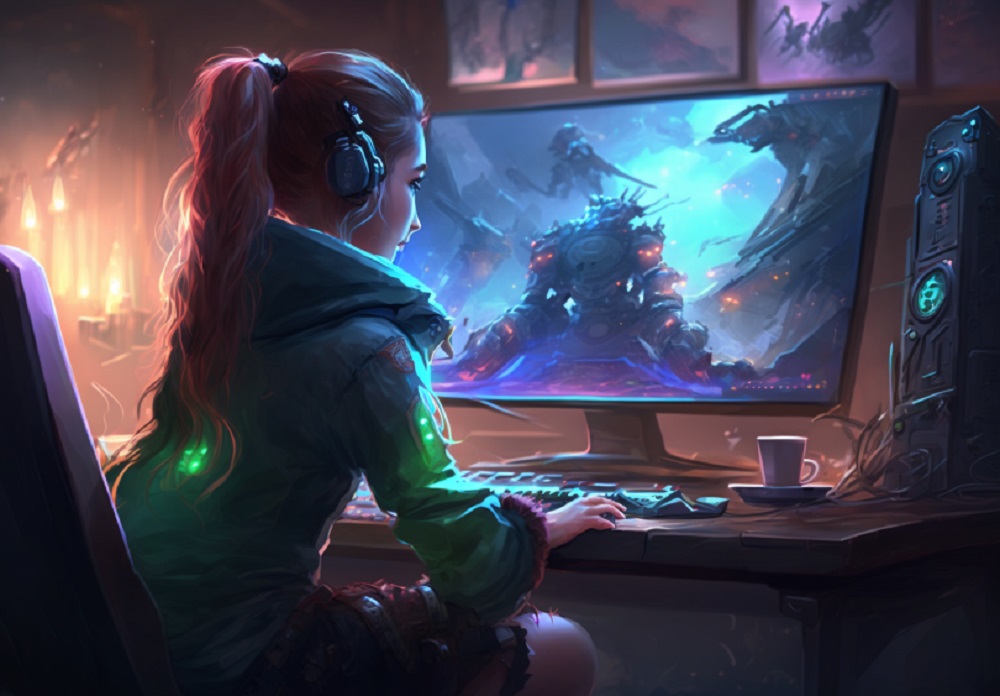50 Top Generative AI Gaming Ideas
Generative AI is transforming the gaming industry by providing innovative, immersive, and personalized experiences for players. By leveraging artificial intelligence, game developers can create dynamic worlds, characters, and stories that evolve and adapt to the choices and actions of each individual player. Here are 50 generative AI gaming ideas that have the potential to revolutionize the future of gaming.
1. Adaptive Storylines
- Generative AI can be used to create adaptive storylines that branch and evolve based on player choices, providing a unique narrative experience every time the game is played.
2. Procedurally Generated Environments
- Using AI algorithms, game worlds can be generated procedurally, creating endless and diverse landscapes for players to explore.
3. Dynamic Characters
- Generative AI can create dynamic characters with unique personalities, backstories, and relationships, bringing a new level of depth to NPC interactions.
4. Customizable Avatars
- AI can assist in the creation of highly customizable avatars, allowing players to design a character that truly reflects their personality and style.
5. Real-time Dialogue Generation
- Generative AI can be employed to generate real-time dialogue between characters, offering players unique and engaging conversations during gameplay.
6. Adaptive Soundtracks
- AI can generate adaptive soundtracks that react to in-game events and player actions, creating a more immersive gaming experience.
7. Procedural Item Generation
- AI can be used to create a vast array of procedurally generated items, providing players with an extensive range of unique weapons, armor, and equipment.
8. Evolving Game Mechanics
- Generative AI can be used to develop evolving game mechanics that adapt to a player's skill level, creating a more accessible and enjoyable experience.
9. Player-Driven Economy
- AI can be utilized to simulate realistic in-game economies that are driven by player actions, such as crafting, trading, and resource gathering.
10. Dynamic Quest Generation
- Generative AI can produce a limitless array of dynamic quests, offering players endless challenges and rewards.
11. Procedural Animation
- AI can generate procedural animations for characters and creatures, creating more realistic and varied movements during gameplay.
12. Real-time Weather and Seasons
- Generative AI can simulate realistic weather patterns and seasonal changes, enhancing the immersion and environmental realism of game worlds.
13. Adaptive AI Opponents
- AI can be used to create adaptive opponents that learn from player strategies and adjust their tactics accordingly.
14. Dynamic Difficulty Adjustment
- Generative AI can analyze player performance and adapt game difficulty in real-time, providing a tailored and challenging experience.
15. Player Behavior Analysis
- AI can analyze player behavior and preferences, allowing developers to create personalized content and gameplay experiences.
16. Generative Art and Graphics
- Generative AI can be employed to create unique and visually stunning game art, textures, and graphics, pushing the boundaries of game aesthetics.
17. Procedural Sound Design
- AI can generate a diverse range of procedural sound effects, enhancing the audio experience of gameplay.
18. AI Dungeon Masters
- Generative AI can act as a virtual dungeon master, guiding players through tabletop-style role-playing adventures within video games.
19. AI-Assisted Game Balancing
- Generative AI can analyze gameplay data to assist developers in balancing game mechanics, ensuring a fair and enjoyable experience for all players.
20. AI-driven Modding
- AI can be used to generate unique and engaging mods, allowing players to customize and extend their gaming experiences.
21. Procedurally Generated Narratives
- Generative AI can create procedurally generated narratives, offering players an endless array of engaging storylines to experience.
22. AI-powered Level Design
- AI can be used to generate level designs that are tailored to player preferences and abilities, creating an optimal gaming experience.
23. Emergent Gameplay
- Generative AI can be utilized to create emergent gameplay, where players can discover new and unexpected ways to interact with the game world and its inhabitants.
24. Real-time Crowd Simulation
- AI can generate realistic crowd simulations, creating bustling cities and lively environments for players to explore.
25. AI-driven Tutorials
- Generative AI can create personalized tutorials that adapt to a player's skill level and learning pace, offering tailored guidance and support.
26. Procedural Music Composition
- AI can compose unique and engaging music scores in real-time, reacting to in-game events and player actions.
27. Dynamic Ecosystems
- Generative AI can simulate realistic ecosystems, complete with flora, fauna, and complex food chains, enhancing environmental immersion and gameplay possibilities.
28. Adaptive Multiplayer Matchmaking
- AI can be used to create adaptive multiplayer matchmaking systems, pairing players with opponents of similar skill levels for a balanced and enjoyable experience.
29. AI-driven Narrative Choices
- Generative AI can analyze player choices and generate narrative consequences, offering a deeper level of choice and consequence in storytelling.
30. Procedurally Generated Puzzles
- AI can create an endless variety of procedurally generated puzzles, providing players with unique challenges and brain teasers.
31. Intelligent Camera Systems
- Generative AI can be used to develop intelligent camera systems that follow the action and adjust framing to provide the optimal viewing experience.
32. Real-time Language Translation
- AI can be employed to provide real-time language translation during gameplay, allowing players from different regions to communicate and collaborate seamlessly.
33. AI-generated Game Reviews
- Generative AI can be utilized to create AI-generated game reviews, offering players personalized recommendations based on their preferences and playstyles.
34. Procedural Event Generation
- AI can generate a wide range of procedural in-game events, providing players with unique encounters and challenges.
35. Dynamic NPC Populations
- Generative AI can be used to simulate dynamic NPC populations, with characters moving, living, and evolving within the game world.
36. AI-driven Easter Eggs
- AI can generate unique and engaging Easter eggs, rewarding players for their curiosity and exploration.
37. AI-assisted Bug Detection
- Generative AI can be employed to identify and fix bugs during game development, ensuring a more polished and stable gaming experience.
38. Procedurally Generated Minigames
- AI can create an assortment of procedurally generated minigames, offering players a variety of fun and engaging distractions.
39. AI-powered Accessibility Features
- Generative AI can be used to develop accessibility features that adapt to a player's needs, ensuring a more inclusive gaming experience.
40. Dynamic Lighting and Shadow Effects
- AI can generate dynamic lighting and shadow effects, enhancing the visual realism and atmosphere of game environments.
41. Procedural Skill Trees
- Generative AI can create procedural skill trees, allowing players to develop and customize their characters in unique ways.
42. AI-assisted Game Localization
- AI can be employed to streamline the game localization process, ensuring accurate translations and cultural adaptations for a global audience.
43. Adaptive VR Experiences
- Generative AI can be used to create adaptive virtual reality experiences, providing a more immersive and personalized gaming experience.
44. AI-generated Achievements
- AI can generate personalized achievements based on player actions and preferences, offering a unique sense of accomplishment and progression.
45. Real-time Resource Management
- Generative AI can simulate realistic resource management systems, providing players with challenging and engaging gameplay mechanics.
46. AI-driven Emotion Analysis
- Generative AI can analyze player emotions through facial expressions or voice, adapting gameplay and story elements to elicit desired emotional responses.
47. Procedurally Generated Game Modes
- AI can generate a variety of procedurally generated game modes, offering players new and engaging ways to experience their favorite games.
48. Dynamic Difficulty Scaling
- Generative AI can dynamically scale game difficulty based on player performance and preferences, ensuring an enjoyable and challenging experience for all skill levels.
49. AI-enhanced Social Interaction
- Generative AI can be employed to create more realistic and engaging social interactions between players and NPCs, fostering a deeper sense of connection and immersion.
50. AI-driven Game Analytics
- Generative AI can be utilized to analyze player behavior and in-game data, providing valuable insights for developers to optimize and refine gameplay experiences.
- Generative AI is poised to revolutionize the gaming industry, offering endless possibilities for the creation of unique, immersive, and engaging gameplay experiences. As developers continue to explore the potential of AI-driven game design, we can expect to see an exciting new era of innovation in gaming. These 50 generative AI gaming ideas represent just a fraction of the potential applications and advancements that can be achieved when combining the power of artificial intelligence with the creativity of game development.
- RiseAngle is utilizing generative AI to democratize game creation and make it accessible to everyone. Follow the link and join the waitlist to stay ahead of the curve in learning about and using RiseAngle’s upcoming generative AI game generator!






